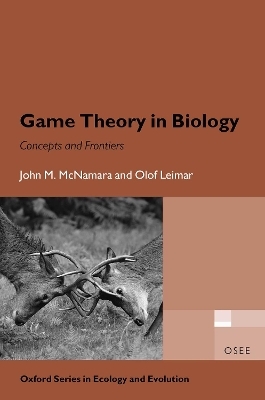
Game Theory in Biology
Oxford University Press (Verlag)
978-0-19-881578-5 (ISBN)
The principles of game theory apply to a wide range of topics in biology. This book presents the central concepts in evolutionary game theory and provides an authoritative and up-to-date account. The focus is on concepts that are important for biologists in their attempts to explain observations. This strong connection between concepts and applications is a recurrent theme throughout the book which incorporates recent and traditional ideas from animal psychology, neuroscience, and machine learning that provide a mechanistic basis for behaviours shown by players of a game. The approaches taken to modelling games often rest on idealized and unrealistic assumptions whose limitations and consequences are not always appreciated. The authors provide a novel reassessment of the field, highlighting how to overcome limitations and identifying future directions.
Game Theory in Biology is an advanced textbook suitable for graduate level students as well as professional researchers (both empiricists and theoreticians) in the fields of behavioural ecology and evolutionary biology. It will also be of relevance to a broader interdisciplinary audience including psychologists and neuroscientists.
John McNamara is Emeritus Professor of Mathematics and Biology at the University of Bristol, UK. After competing his doctorate on black holes in 1976, he changed his research focus to animal behaviour and evolutionary biology. In these fields he has developed approaches to modelling behaviour, particularly approaches based on state variables. In studying animal behaviour his objective has been to provide theoretical explanations of known phenomena and to motivate and steer the direction of new experiments. Areas in which he has contributed include foraging theory, life history theory, and game theory. Olof Leimar is Emeritus Professor of Zoology at Stockholm University, Sweden. After studying theoretical physics in Stockholm, he switched to biology and completed his doctorate in 1988 with a thesis on game-theory analysis of animal fighting. In modelling animal behaviour, he introduces behavioural mechanisms, including mechanisms from learning psychology to achieve greater biological realism. In addition to fighting behaviour, he has applied this approach to the evolution of warning colouration and mimicry. Other fields he has worked in include sex allocation, mutualism, life-history theory, developmental plasticity and phenotype determination. He develops mathematical models, but he has also been involved in experimental work in his areas of interest.
1: Setting the scene
2: Central concepts
3: Standard examples
4: Stability concepts: beyond Nash equilibria
5: Learning in large worlds
6: Co-evolution of traits
7: Variation, consistency, and reputation
8: Interaction, negotiation, and learning
9: Games embedded in life
10: Games over generations
11: Future perspectives
Appendix A: Summary of notation
Appendix B: Solutions to exercises
| Erscheinungsdatum | 16.11.2020 |
|---|---|
| Reihe/Serie | Oxford Series in Ecology and Evolution |
| Verlagsort | Oxford |
| Sprache | englisch |
| Maße | 157 x 234 mm |
| Gewicht | 552 g |
| Themenwelt | Naturwissenschaften ► Biologie ► Evolution |
| Naturwissenschaften ► Biologie ► Zoologie | |
| ISBN-10 | 0-19-881578-6 / 0198815786 |
| ISBN-13 | 978-0-19-881578-5 / 9780198815785 |
| Zustand | Neuware |
| Informationen gemäß Produktsicherheitsverordnung (GPSR) | |
| Haben Sie eine Frage zum Produkt? |
aus dem Bereich


